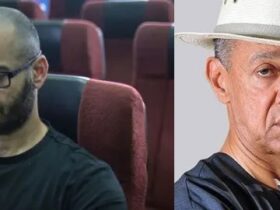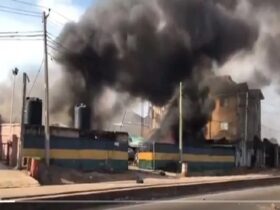As the year 2023 comes to an end in a few weeks from now, Parallel Facts compiled a list of important events that shaped Nigeria’s political space and the memories that linger in the minds of Nigerians.
1. 2023 General Elections
The 2023 general elections saw the controversial declaration of Bola Tinubu of the All Progressive Congress (APC) as the winner of the 2023 presidential election by Independent National Electoral Commission (INEC).

Tinubu, from the ruling APC party, secured a total of 8,794,726 votes, or approximately 35%, defeating his three main rivals: Atiku Abubakar of the main opposition Peoples Democratic Party (PDP) with 6,984,520 votes (29%), and Peter Obi of the Labour Party, who received 6,101,533 votes (25%). The 2023 Nigerian gubernatorial and National Assembly (NASS) elections, held on March 18 and March 25, respectively, marking a significant turning point in the country’s political landscape. It was a tsunami as some political bigwigs lost their seats to first-timer politicians who rode on the wave of the political movement at the time. For instance, the OBIdient Movement came all out to vote against the old order with landslide victories recorded in Lagos, Abuja, Plateau, amongst other States of the federation.
2. Tinubu’s Inauguration
Bola Tinubu, the ‘Emi Lokan’ crooner, alongside Kashim Shettima, was sworn in as the 16th president and vice-president of Nigeria on May 29, 2023, respectively. The inauguration ceremony heavily criticised for coming at a time when Nigerians had wanted a breadth of fresh air, took place at Eagle Square in Abuja.
3. LP, PDP & APC Legal Tussle
The legal battle for the presidency of Nigeria concluded after eight months, with Bola Tinubu of the ruling All Progressives Congress (APC) emerging victorious. The Supreme Court upheld the verdict of the Presidential Election Petition Court (PEPC) on September 6. The court ruled in favour of Tinubu on all counts, stating that the Independent National Electoral Commission (INEC) had substantially complied with the Electoral Act and the Constitution. The court also rejected Atiku’s fresh evidence and resolved seven issues in favor of Tinubu.
The seven issues the court resolved in favour of Tinubu include: INEC substantially complied with the Electoral Act 2022 and the constitution in the conduct of the poll; election cannot be nullified due to unavailability of results on INEC’s IReV portal; failure to secure 25 per cent of votes in the Federal Capital Territory, FCT, Abuja cannot invalidate a winner’s election; petitioners did not prove allegations of rigging; the issue of APC’s double nomination of Vice President Kashim Shettima had earlier been decided by the court on May 26, 2023; and Tinubu’s forfeiture of $460, 000 drug money was raised when the Respondents had already filed their process. However, many Nigerians faulted the stance of the judiciary on the grounds that the justices used technicality rather than looking at the case holistically.
4. Subsidy Removal Brouhaha
Tinubu, in his inaugural address dated May 29, announced the removal of the fuel subsidy to ease pressure on government finances. He declared that the decade-long subsidy on petroleum products was scrapped, leading to an immediate increase in fuel prices across the country. The removal of fuel subsidies had various trickle-down effects on the economy, including higher transportation costs, inflationary pressure, and impacts on transportation and other sectors. The move resulted in a significant rise in the inflation rate and a depreciation of the naira against the dollar.
READ MORE: Alex Otti to Pay 13th Month Salary to Abia State Workers
The fuel subsidy removal has led to a sharp increase in the pump price of petrol to above N630 per litre in many places, which is an unprecedented hike. This has had a ripple effect on the prices of other goods and services, such as transportation, food, school fees, and health care, etc.
The inflation rate on the other hand has also risen to above 27 per cent, the highest ever recorded since the emergence of Tinubu as President. The naira has also depreciated against the dollar, and it is now exchanging for more than N800 to $1 officially, while trading about N1,160 to $1 in the black market, which is a difference of almost N500 between both markets. These factors have eroded the purchasing power and the standard of living of many Nigerians, especially the most vulnerable, the self-employed, and the unemployed.
5. Presidential Yacht
Last month, Tinubu’s administration proposed to spend N5.095 billion on a presidential yacht as part of the 2023 supplementary budget. Despite criticism and public outcry over the extravagant spending, the Presidency clarified that the “Presidential Yacht” was an operational naval boat with specialised security features, not intended for Tinubu’s personal use. This came at a time when Nigerians were battling with serious food inflation amongst other economic issues.
6. Tinubu’s Drug Allegations
In October 2023, the FBI released documents that made allegations about Bola Tinubu’s involvement in drug trafficking and money laundering. The files, which were obtained through a Freedom of Information Act (FOIA) request, detailed Tinubu’s alleged connection to a heroin trafficking ring in Chicago. The FBI investigation is ongoing and is focused on Tinubu’s association with the drug trafficking network. The released files contain information about individuals linked to the alleged heroin trafficking operation, including Lee Andrew Edwards, Mueez Akande, Abiodun Agbele, and Bola Ahmed Tinubu.
7. Natasha’s Emergence As Kogi’s 1st Female Senator
Natasha Akpoti-Uduaghan emerged as Kogi’s first female senator on November 2, 2023. The Court of Appeal affirmed her Tribunal victory, declaring her the duly elected candidate for Kogi Central Senatorial election on February 28, 2023. The court dismissed the appeal filed by APC’s Abubakar Ohere, upholding Akpoti-Uduaghan as the actual winner of the senatorial poll. This was another political event that rocked the country in 2023.
8. COP28 And Nigerian 1141 Delegates
Nigeria, with a delegation of 1,141 participants, was one of the most represented countries at the 28th Conference of the Parties to the United Nations Framework Convention on Climate Change (COP28) held in Dubai from November 30 to December 12, 2023. This included government officials, policymakers, scientists, activists, and representatives from the private sector.
In a twist of reality, Nigeria, a lower-middle-income economy ranked 165th in GDP per capita globally, managed to register the third-highest number of delegates at the 28th Session of the Conference of the Parties (COP28) for the United Nations Framework Convention on Climate Change (UNFCCC) in Dubai, trailing only behind the host country, the United Arab Emirates, and Brazil.
Comparative analysis with other nations further highlights the peculiarity of Nigeria’s approach. Developed economies like Germany, the United States, and the United Kingdom, with significantly higher GDP per capita figures, opted for much smaller delegations. The UK, for instance, with a GDP per capita of $46,510, attended with less than half the number of delegates Nigeria brought to Dubai.
9. Ondo Crisis
Ondo has been embroiled in a political crisis in recent times. The crisis began when Governor Rotimi Akeredolu returned from a medical trip in May 2023. The controversy involved rumours about Akeredolu’s health, allegations of mismanagement, and internal conflicts within the ruling All Progressives Congress (APC).
Governor Akeredolu, who has been on medical leave in Germany since September, has chosen to recover in his Ibadan residence, leading to a five-month-long political turmoil in the State.
The invocation of the doctrine of necessity is anticipated to bring a swift resolution to the crisis, as the Ondo State House of Assembly is set to reconvene on Monday to formalise Aiyedatiwa’s appointment as acting governor, granting him full executive powers to lead the state.
Tinubu’s intervention was prompted by growing concerns over the escalating political tension in Ondo, exacerbated by Akeredolu’s prolonged absence and the power struggles within the cabinet and the legislative assembly. At the time of filing this report, Akeredolu has embarked on another medical leave amidst political crisis bedeviling the State.
10. Edo/Rivers Political Wrangling
A bitter feud erupted in Rivers State between Governor Sir Similanayi Fubara and the Federal Capital Territory (FCT) Minister, leading to political turbulence. Accusations and counter-accusations were exchanged between the two camps, with Chieftain Karibo Wilson expressing confidence in Governor Fubara’s widespread support. The crisis evolved around allegations of neglect of the state’s political structure, with Bola Tinubu intervening to salvage the situation.
Wike, who is the Minister of the Federal Capital Territory, FCT, had accused Fubara of neglecting the structure that brought him into power.
Though Tinubu’s intervention diffused the situation but the drama seems to have no end in sight, especially with the recent defection of 27 PDP lawmakers to APC.








Leave a Reply